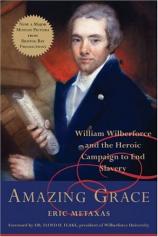Amazing Grace: William Wilberforce and the Heroic Campaign to End Slavery
Review
Amazing Grace: William Wilberforce and the Heroic Campaign to End Slavery
Just in time for the cinematic release of the same name, Eric Metaxas brings the dynamic but little-known story of British slave trade reformer William Wilberforce to life in this engrossing inspirational biography, AMAZING GRACE.
Metaxas's chronological narrative begins with Wilberforce's childhood, showing how the death of an older sister and Wilberforce's father, followed by the illness of his mother, put Wilberforce into the care of a wealthy aunt and uncle who were at the center of England's spiritual renaissance, "a glowing hotbed of Methodism." One of the aunt and uncle's close friends was John Newton, a former slave-ship captain who wrote the hymn "Amazing Grace" and who would profoundly influence Wilberforce's life.
Metaxas excels at showing the grief Wilberforce feels when his mother, fearful of the religious influence Wilberforce encounters, forcibly removes him from the aunt and uncle's home and forbids him to attend church. By the time 16-year-old Wilberforce goes to Cambridge, he is, as Metaxas writes, "vain and full of fun…. his manners and social graces had been buffed to a high sheen…." Metaxas carefully unfolds how the diminutive Wilberforce moved from being a young, privileged, wealthy politician who spent his evenings gambling and playing cards to an eloquent orator who suffered from a digestive disorder and poor eyesight but became convinced he could make a difference in politics as a devout Christian.
The difference would come on two fronts: "manners" and the slave trade. The author's details about the desperate conditions in which slaves were transported have been written about elsewhere, but will nevertheless shock most readers (especially the "Zong" slave ship case, in which sick slaves were "legally" thrown overboard in order to save money). Metaxas's own outrage comes through in passages such as when he examines a diagram of where the slaves are placed on a ship, and notes: "To look at the image is to crawl to the edge of the abyss, and to stare, agape, at the horror."
Wilberforce also worked to "reform manners," which sounds hopelessly prudish to modern ears, but Metaxas helps readers understand this in light of the ugly, violent and often cruel times in which Wilberforce lived. ("Manners" refers to "attitudes" rather than etiquette). Among the attitudes Wilberforce sought to change was society's view of the poor from that of being ignored or judged to shouldering a responsibility to help the poor better their situations.
The narrative borders on hagiography, from Wilberforce's childhood (in which Metaxas describes him as a "glorious little child, a veritable cherub of twinkling luminosity" or "…brilliantly witty, indefatigably effervescent, and brightly cheerful, not to mention generous") to his legacy ("…it's nearly impossible to do justice to the enormity of his accomplishment: it was nothing less than a fundamental and important shift in human consciousness"). Occasionally, Metaxas gets carried away with wordy prose, as when he describes Wilberforce as "…the sort of boy who could lead even the most jaded misanthropes to think that perhaps the supremely cracked-up race of bipeds of which they were a member was not entirely, not hopelessly, unredeemable."
Metaxas has a wonderful sense of humor, however, that comes through in subtle ways, whether he's punning on someone's name or noting when Wilberforce accidentally shoots the future prime minister William Pitt the Younger while hunting: "Perhaps most scandalous of all, they waited many years before informing the press."
Wilberforce's greatest achievement was indisputably the 1807 landmark victory to abolish the slave trade, which was the work of two decades. (Emancipation in Britain came in 1833, when Wilberforce was on his deathbed.) Metaxas laudably puts this into context for us in his introduction, which reminds us that we can no longer even imagine the society Wilberforce lived in --- a society in which slavery is taken for granted and the idea that slavery was good. "Wilberforce murdered that old way of seeing things…. The entire mind-set that supported it is gone."
Metaxas is a veteran author who has written for The New York Times and The Atlantic and has penned several books (EVERYTHING YOU ALWAYS WANTED TO KNOW ABOUT GOD). He does a fine job fleshing out the spiritual and moral times Wilberforce lived in, so the reader has some idea of the tremendous uphill battle Wilberforce faced. His background information on the politics of the time period (elections, such as the one that sent Wilberforce to Parliament, were usually purchased with bribe money) will be invaluable to modern readers without a lot of knowledge of this aspect of English government in the late 1700s to early 1800s.
Metaxas's story of Wilberforce's driving passions, which changed the world, is sure to inspire readers to ponder how they can make a difference in their spheres of influence today.
Reviewed by Cindy Crosby on February 6, 2007





